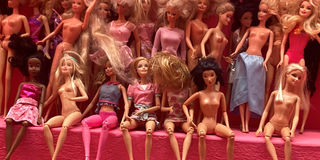Reflections on Barbie dolls and the tyranny of beauty ideals

Barbie dolls. They illustrate stereotypes of beauty that black girls are exposed to.
What you need to know:
- We succumb to the perils of harmful chemicals to straighten our hair and sacrifice our hairlines for braids and weaves in pursuit of Westernised notions of beauty.
- I remind my daughter consistently that her blackness is undeniably beautiful, yet I cannot help but worry about the conflicting messages infiltrating her world.
As a devoted feminist and a mother of a young girl, I find myself at a crossroads every time I consider gifting her a doll.
The one perpetually beckoning is the ubiquitous Barbie doll. It’s fascinating how this doll, despite my heartfelt sermons urging her to cherish dolls that resemble her, still maintains its magnetic allure.
I bought her beautiful black dolls, hoping to emphasise the importance of embracing diversity. Yet, these “sisters” remain untouched, while the allure of the Barbie doll continues to reign supreme.
I fortified my message by presenting her with Lupita Nyong’o’s masterpiece Sulwe, a captivating tale that underscores the beauty of loving the skin we are in, but the allure of that iconic Barbie doll refused to fade away.
It is during such moments that I realise the sway of beauty standards, particularly those rooted in Western ideals, holds remarkable influence over her young mind. Over many women’s minds, in fact. I reclaimed a little bit of my authority when I said ‘No’ to her request of watching the movie Barbie on the big screen.
The ripple effect caused by the legacy of a doll birthed in 1959 has permeated our society to an astonishing extent, leaving us grappling with colourism and racism, breeding discomfort towards our own beautiful black skin and natural hair textures.
Harmful chemicals
A casual stroll through the vibrant streets of downtown Nairobi, where women peddle jars of dubious skin-lightening potions, swiftly serves as evidence that colourism still thrives.
We succumb to the perils of harmful chemicals to straighten our hair and sacrifice our hairlines for braids and weaves in pursuit of Westernised notions of beauty. I, too, have walked these paths, except for the perilous journey of skin bleaching.
Having navigated the spectrum of short and long hair, I can attest to the unsolicited commentary from male barbers, who often impose their preferences upon us.
“Does your husband approve?” queried a barber with a hint of disapproval, his tool of trade precariously close to my scalp.
It struck me that he never paused to ask about my marital status; instead, he hastily enforced beauty ideals he assumed I had yet to encounter.
My response was a swift affirmation, prioritising the shave over discussing my marital status.
This incident, among others, made me wonder whose lens shapes our perception of beauty standards. I remind my daughter consistently that her blackness is undeniably beautiful, yet I cannot help but worry about the conflicting messages infiltrating her world through movies, books, and a barrage of beauty products designed to negate her beauty.
The world around her counteracts my efforts, unfurling a narrative that burdens her simply because of her skin tone.
I don’t have a magic wand to take away racism and colourism, but sometimes I wish I did.
***
My article last week on why we should unlearn and normalise discussions on the vagina attracted a tyranny of mixed comments from male readers.
These reactions ranged from outrage to cheeky banter, with a sprinkle of positive engagement. Once again, and almost as if scripted, the voices of women were glaringly absent from a discourse concerning an integral part of their own bodies.
Until we actively dismantle the walls of silence surrounding such topics, we are destined to perpetually wage battles that have spanned centuries.
The writer comments on social and gender topics (Twitter @FaithOneya; [email protected]).





